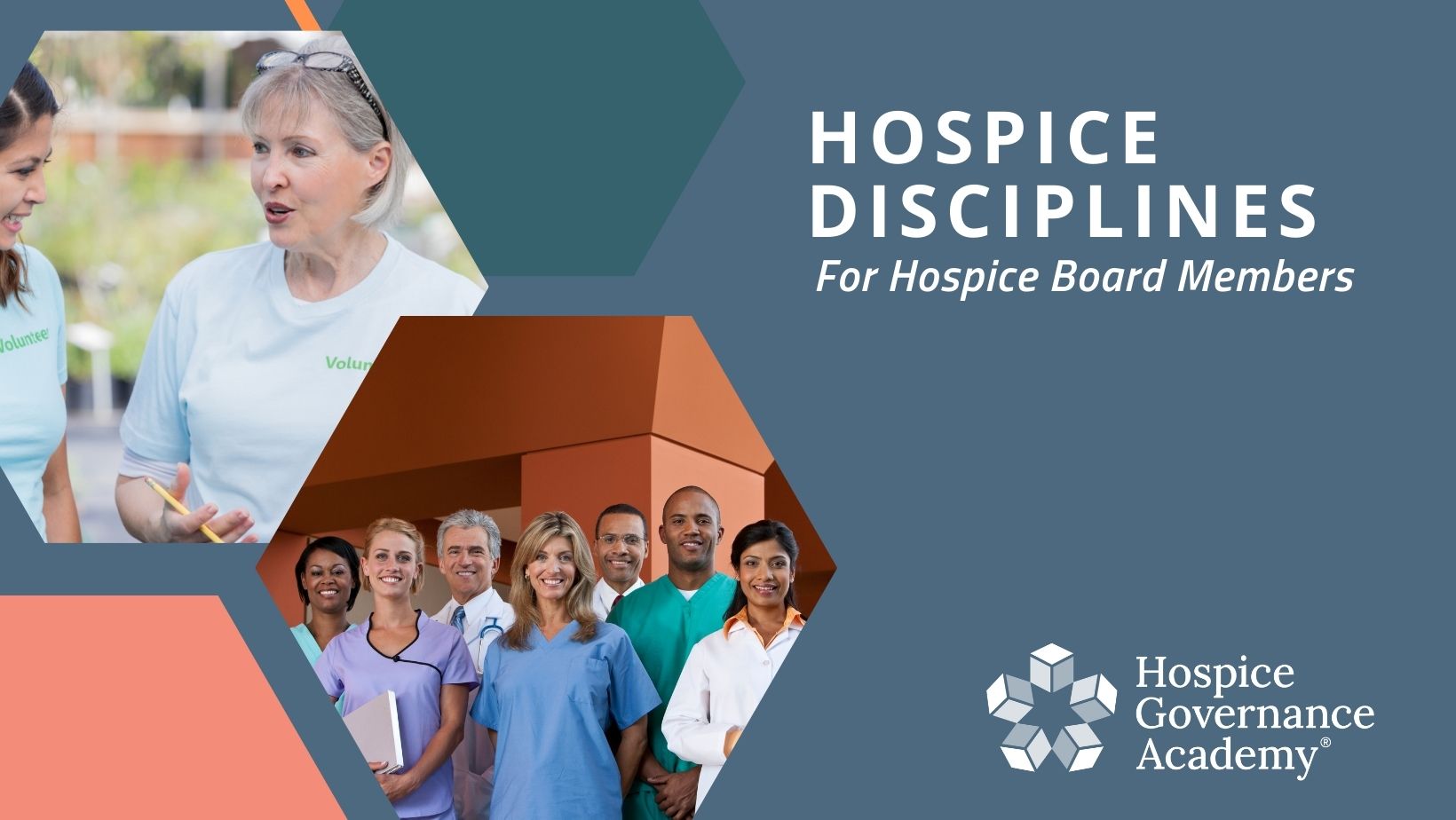
‘Team’ (in reference to Interdisciplinary Team) suggests a level of mutual support, constant collaboration, and constant communication. This is the sort of thing that’s vitally important when you’re caring for the complex needs of a patient and family and at the end of life. The collaboration and the mutual support creates a dynamic that is much greater than the sum of its parts.
Hospice Disciplines for Hospice Board Members
The Hospice Interdisciplinary Team (IDT) includes every specialist responsible for a hospice patient’s physical, mental, and spiritual health – from the doctors and nurses, to therapists and social workers, to chaplains and trained volunteers. This is the village that not only cares for a patient, but works together to develop and maintain a plan care.
Join Bill Musick, President of Integriti3D, for the Hospice Discipline for Board Members series, where he dives deeper into five of the disciplines: nursing, physicians, psychosocial, aides, and volunteers. New Hospice Governance Academy (HGA) Spotlight Interview episodes will be released in August, September, and October.
The first segment of each interview is available for free below. The full interviews are available on the Hospice Governance Academy. Click the link below to log in or start your free trial.
The Hospice Interdisciplinary Group: The Psychosocial Team
Barbara Ivanko is a licensed clinical social worker and instructor at the University of Pittsburgh Graduate School of Social Work and a former hospice executive. Click to watch the first segment of this HGA Spotlight Interview where Barbara talks to Bill Musick, President of Integriti3D, about psychosocial support provided by certain disciplines of the hospice team, namely medical social services and counseling. Three disciplines provide the bulk of the psychosocial support for hospice patients and their families: medical social work, bereavement, and spiritual counseling.
The Role of the Aide in Hospice Care
Celeste Wooten is the CNA Coordinator at Intrepid USA Healthcare Services. Click to watch the first segment of this HGA Spotlight Interview where Celeste breaks down the role of the aide in hospice and palliative care. Medicaid requires that an aide care plan is written by the RN Case Manager and that every 14 days, the RN completes a supervisory visit. The notes taken by the CNA during these visits become progress reports that the IDT uses to adjust the patient’s care plan.
Hospice Disciplines for Board Members: Physicians
In this interview, Dr. Laura Patel, Chief Medical Officer at Transitions LifeCare, discusses the role of physicians in hospice and palliative care. She shares her own insights on the move towards professionalization of the physician’s role and the importance of a connection to hospice through certifications. Dr. Patel and Bill Musick, President of Integriti3D, also cover how a patient’s own physicians and hospice physicians work together to support the care plan and manage symptoms.
The Role of Volunteers in Hospice and Palliative Care
Nikkie Preston, Director of Community Engagement and Volunteer Services at Infinity Hospice Care, dives into the role of volunteers in hospice and palliative care. Medicare states that 5% of a hospice’s patient care hours must be volunteer hours – assisting as a patient companion or providing small amounts of respite relief. Volunteers can also help beyond the 5% to support fundraising efforts and more. Tune in for tips to manage participation, overcome pandemic-related challenges, and keep volunteers coming back year after year.
The Role of Nurses in Hospice and Palliative Care
Dr. Bob Parker, Executive Vice President of Operations for Hospice at Home, Chief Clinical Officer, and Chief Compliance Officer for Intrepid USA Healthcare, explains how the nurse is the core of every interdisciplinary team. Nurses put the plans of care together, they provide the care, and they are the ones working to bring the IDT together in a way that all of the needs of the patient are met. Parker also walks through the difference degrees, certifications, and licenses nurses hold and what they mean.
Finally, hospice-focused board development
The Hospice Governance Academy was created to provide industry-specific content directly to hospice leaders. HGA is an easy, online learning platform that ensures your board has a shared base of core hospice governance knowledge and up-to-date information on trends and issues facing hospice care today. Content is contributed regularly by industry-recognized experts.
